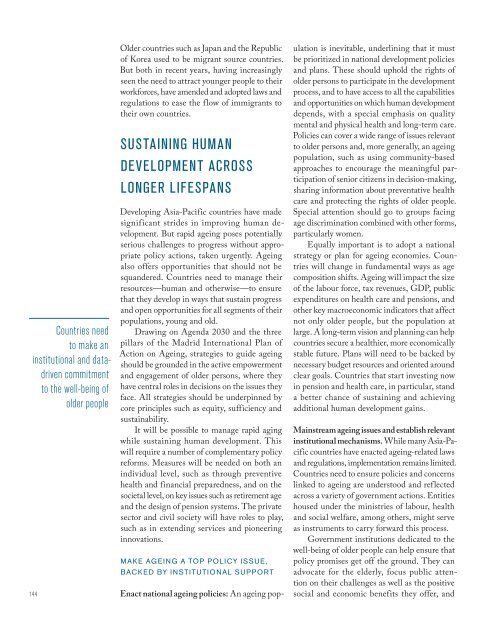SHAPING THE FUTURE HOW CHANGING DEMOGRAPHICS CAN POWER HUMAN DEVELOPMENT
1VPo4Vw
1VPo4Vw
Create successful ePaper yourself
Turn your PDF publications into a flip-book with our unique Google optimized e-Paper software.
Countries need<br />
to make an<br />
institutional and datadriven<br />
commitment<br />
to the well-being of<br />
older people<br />
144<br />
Older countries such as Japan and the Republic<br />
of Korea used to be migrant source countries.<br />
But both in recent years, having increasingly<br />
seen the need to attract younger people to their<br />
workforces, have amended and adopted laws and<br />
regulations to ease the flow of immigrants to<br />
their own countries.<br />
SUSTAINING <strong>HUMAN</strong><br />
<strong>DEVELOPMENT</strong> ACROSS<br />
LONGER LIFESPANS<br />
Developing Asia-Pacific countries have made<br />
significant strides in improving human development.<br />
But rapid ageing poses potentially<br />
serious challenges to progress without appropriate<br />
policy actions, taken urgently. Ageing<br />
also offers opportunities that should not be<br />
squandered. Countries need to manage their<br />
resources—human and otherwise—to ensure<br />
that they develop in ways that sustain progress<br />
and open opportunities for all segments of their<br />
populations, young and old.<br />
Drawing on Agenda 2030 and the three<br />
pillars of the Madrid International Plan of<br />
Action on Ageing, strategies to guide ageing<br />
should be grounded in the active empowerment<br />
and engagement of older persons, where they<br />
have central roles in decisions on the issues they<br />
face. All strategies should be underpinned by<br />
core principles such as equity, sufficiency and<br />
sustainability.<br />
It will be possible to manage rapid aging<br />
while sustaining human development. This<br />
will require a number of complementary policy<br />
reforms. Measures will be needed on both an<br />
individual level, such as through preventive<br />
health and financial preparedness, and on the<br />
societal level, on key issues such as retirement age<br />
and the design of pension systems. The private<br />
sector and civil society will have roles to play,<br />
such as in extending services and pioneering<br />
innovations.<br />
MAKE AGEING A TOP POLICY ISSUE,<br />
BACKED BY INSTITUTIONAL SUPPORT<br />
Enact national ageing policies: An ageing population<br />
is inevitable, underlining that it must<br />
be prioritized in national development policies<br />
and plans. These should uphold the rights of<br />
older persons to participate in the development<br />
process, and to have access to all the capabilities<br />
and opportunities on which human development<br />
depends, with a special emphasis on quality<br />
mental and physical health and long-term care.<br />
Policies can cover a wide range of issues relevant<br />
to older persons and, more generally, an ageing<br />
population, such as using community-based<br />
approaches to encourage the meaningful participation<br />
of senior citizens in decision-making,<br />
sharing information about preventative health<br />
care and protecting the rights of older people.<br />
Special attention should go to groups facing<br />
age discrimination combined with other forms,<br />
particularly women.<br />
Equally important is to adopt a national<br />
strategy or plan for ageing economies. Countries<br />
will change in fundamental ways as age<br />
composition shifts. Ageing will impact the size<br />
of the labour force, tax revenues, GDP, public<br />
expenditures on health care and pensions, and<br />
other key macroeconomic indicators that affect<br />
not only older people, but the population at<br />
large. A long-term vision and planning can help<br />
countries secure a healthier, more economically<br />
stable future. Plans will need to be backed by<br />
necessary budget resources and oriented around<br />
clear goals. Countries that start investing now<br />
in pension and health care, in particular, stand<br />
a better chance of sustaining and achieving<br />
additional human development gains.<br />
Mainstream ageing issues and establish relevant<br />
institutional mechanisms. While many Asia-Pacific<br />
countries have enacted ageing-related laws<br />
and regulations, implementation remains limited.<br />
Countries need to ensure policies and concerns<br />
linked to ageing are understood and reflected<br />
across a variety of government actions. Entities<br />
housed under the ministries of labour, health<br />
and social welfare, among others, might serve<br />
as instruments to carry forward this process.<br />
Government institutions dedicated to the<br />
well-being of older people can help ensure that<br />
policy promises get off the ground. They can<br />
advocate for the elderly, focus public attention<br />
on their challenges as well as the positive<br />
social and economic benefits they offer, and


